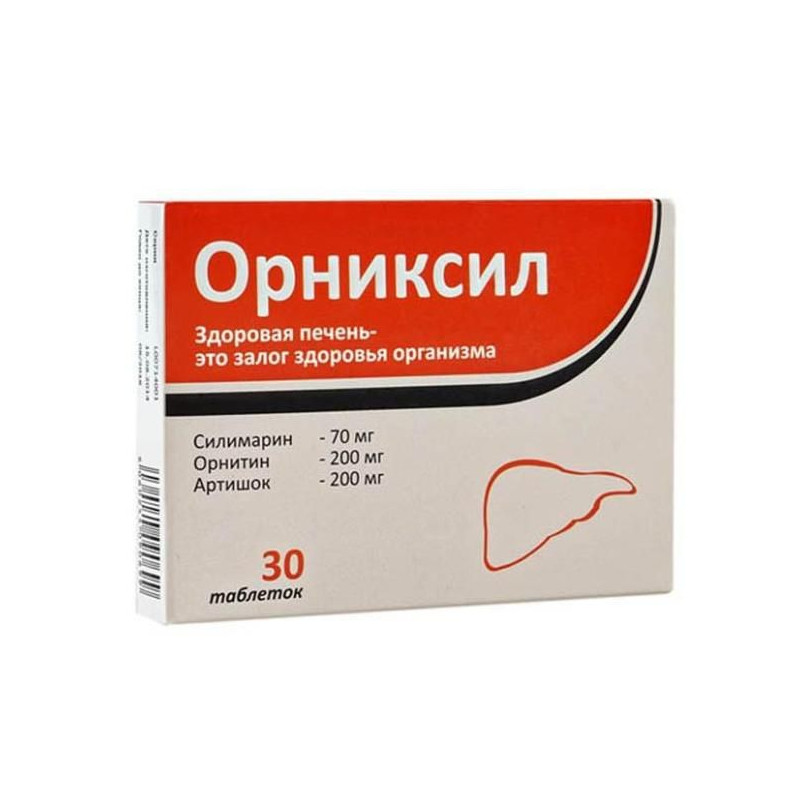



 All payments are encrypted via SSL
All payments are encrypted via SSL
 Full Refund if you haven't received your order
Full Refund if you haven't received your order
Each pill contains: |
|
Ornithine | 200 mg |
Silymarin | 70 mg |
Artichoke | 200 mg |
Hepatoprotectant, desintoxicant, hypoazotemic, hypoammonium, choleretic, diuretic
Ornithine - a replaceable amino acid, plays an important role in the biosynthesis of urea. It has a detoxification, hypoazotemic, hepatoprotective, hypoammonic effect. Disposes ammonium groups in the synthesis of urea (ornithine cycle). Reduces the concentration of ammonia in the blood plasma, helps to normalize the acid-base status (KHS) of the blood, while improving the solubility of salts and accelerates their excretion in the urine. Ornithine, enhancing the ornithine cycle, accelerates the utilization of organic nitrogen complexes to urea and reduces the synthesis of uric acid. Ornithine, reducing the synthesis of uric acid, prevents the formation of kidney stones. Ornithine also stimulates insulin and growth hormone
Silymarin - means containing a complex of flavonoid compounds derived from Milk thistle. Silymarin has a regenerating, detoxifying, hepatoprotective and anti-inflammatory effect. The mechanism of action of the drug is associated with its ability to activate the synthesis of vital proteins and phospholipids in hepatocytes, due to the stimulation of RNA polymerase. Silymarin has a pronounced antioxidant effect, helps to protect cells from the negative effects of free radicals and peroxide compounds. Thus, inhibition of lipid peroxidation processes in hepatocytes occurs, which contributes to the preservation of cellular structures and their early regeneration. The drug not only reduces the intensity of the formation of malonaldehyde, but also regulates the absorption of oxygen by the cells. The drug enhances the detoxification activity of the liver by increasing the accumulation of glutathione. When alcohol intoxication drug reduces the formation of acetaldehyde. Silymarin has a pronounced membrane-stabilizing effect, due to the biochemical interaction with cell membranes, the drug prevents the loss of substances contained in the cell, and improves metabolic processes
Artishok has choleretic, hepatoprotective and diuretic effects. It also helps to reduce the level of urea in the blood serum. The drug increases the ability of hepatocytes to produce coenzymes, which improves the metabolism of cholesterol, lipids and the metabolism of ketone bodies. With concomitant antibiotic therapy acts on the parenchyma of the kidneys and liver, as a detoxifying agent. Inulin and Vitamins of group B (B2, AT1) included in the list of biologically active substances artichoke, normalize metabolic processes in the body. The drug helps to cleanse the body of toxins, including nitro compounds, salts of heavy metals and alkaloids.
The drug is used in the complex treatment of diseases of the liver, gallbladder and kidneys of various etiologies, including:
Medicinal lesions of the liver and the period of taking drugs with hepatotoxic properties:
With free use by the consumer, it is necessary to comply with the rules that are listed on the packaging. If the drug is prescribed by a doctor, changes in the dosage are possible: one pill 1-2 times a day, by mouth, after meals
Rarely, skin reactions, in some cases, nausea and vomiting are possible.
Severe renal failure (with plasma creatinine levels greater than 3 mg / 100 ml), hypersensitivity to the drug components
Increased symptoms of side effects. Treatment: gastric lavage, reception of Activated carbon, symptomatic therapy
Indicated on packaging and on blisters. Do not apply after the expiration date
At a temperature not higher than 250C. In the reach of children.
